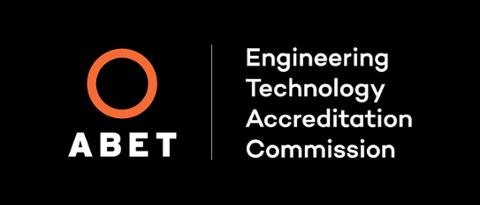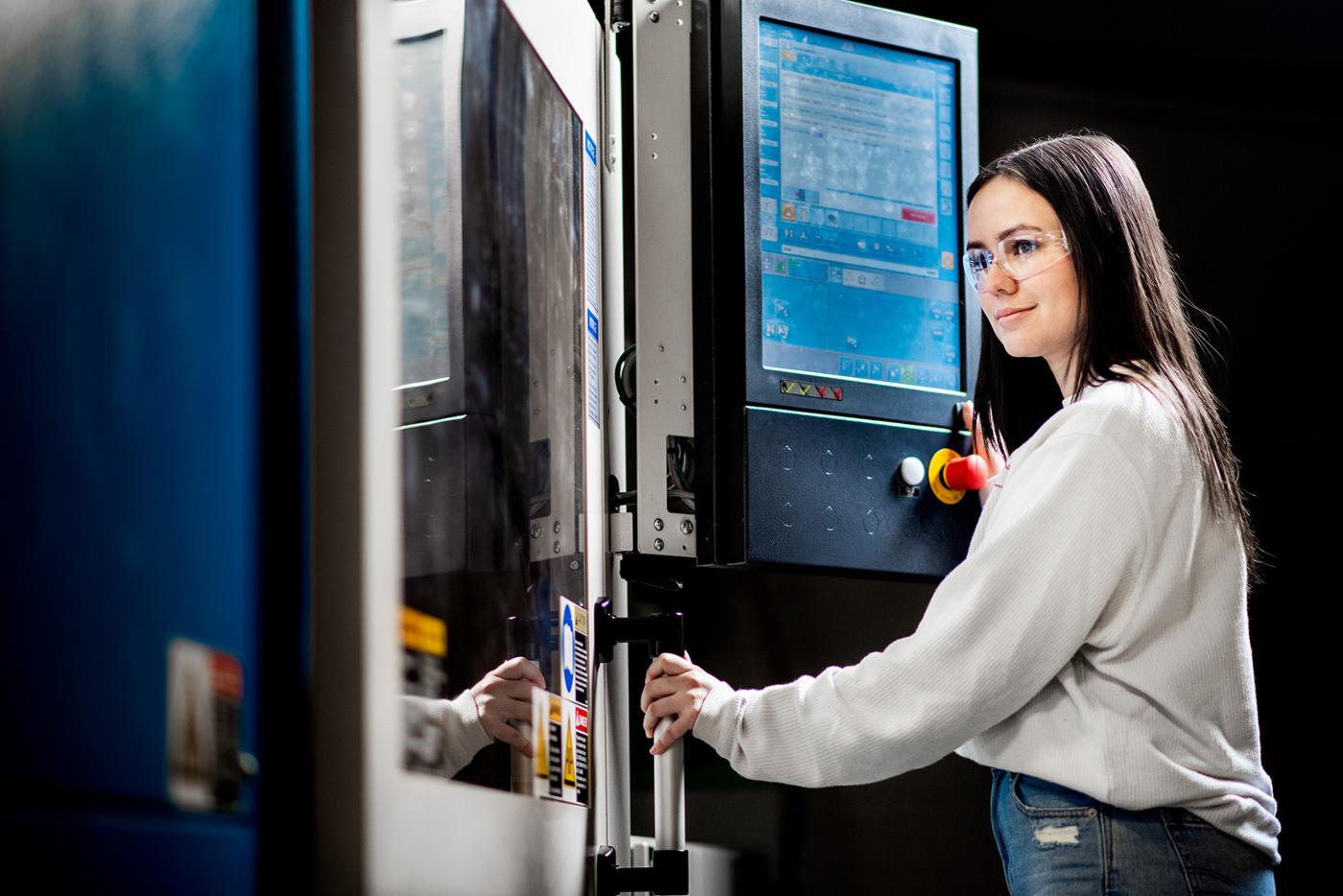Automotive and Engineering Technology Programs Accreditation
Accreditation assures that Pitt State Automotive and Engineering Technology programs meet the profession's quality standards for which that program prepares graduates.Engineering Technology

Engineering Technology
ABET Accreditation
The Engineering Technology program is accredited by the Engineering Technology Accreditation Commission (ETAC) of ABET.
About
ABET accreditation assures confidence that a collegiate program has met standards essential to prepare graduates to enter critical STEM fields in the global workforce. Graduates from an ABET-accredited program have a solid educational foundation and are capable of leading the way in innovation, emerging technologies, and in anticipating the welfare and safety needs of the public. See accreditation criteria

Data, Objectives, and Outcomes
Enrollment and Graduation Data
Engineering Technology Enrollment
| Academic Year | Electronics | Manufacturing | Mechanical | Plastics |
|---|---|---|---|---|
| 2020 | 44 | 35 | 122 | 77 |
| 2021 | 49 | 31 | 95 | 81 |
| 2022 | 48 | 36 | 78 | 75 |
| 2023 | 42 | 34 | 82 | 60 |
| 2024 | 37 | 33 | 64 | 51 |
Engineering Technology Degrees Awarded
| Academic Year | Electronics | Manufacturing | Mechanical | Plastics |
|---|---|---|---|---|
| 2019–2020 | 8 | 14 | 21 | 22 |
| 2020–2021 | 5 | 10 | 28 | 16 |
| 2021–2022 | 9 | 5 | 23 | 19 |
| 2022–2023 | 8 | 11 | 16 | 27 |
| 2023–2024 | 8 | 7 | 12 | 15 |
Accreditation
The Pittsburg State University Engineering Technology Programs (Electronics, Manufacturing, Mechanical, Plastics) are accredited by the Engineering Technology Accreditation Commission of ABET, https://www.ABET.org. ABET accreditation provides assurance that college or university programs meet the quality standards of the profession for which that program prepares graduates.
Why ABET Accreditation Matters?
How ABET-accredited programs provide required minimum for professional recognition
Career Options
Engineering vs Engineering Technology
This is a common question that many prospective students ask. To understand the difference and to help decide if PSU's Engineering Technology is a good choice for you, please read the PDF file below. The comparisons were taken in part from a brochure, "Mechanical Engineering and Mechanical Engineering Technology, Which Path Will You Take", published by the American Society of Mechanical Engineers. Changes have been made to apply the comparisons to undergraduate engineering programs and PSU Engineering Technology programs.
Take a Virtual Tour
Click on the links below to take a Virtual Tour of the Engineering Technology Labs!
Objectives and outcomes
Electronics Engineering Technology
Objectives
The Electronics Engineering Technology Program produces graduates that are valued by industry regionally and across the globe. We are preparing people to be successful in a wide spectrum of electronic careers.
The program's educational objectives state that Electronics Engineering Technology program graduates will:
- Be sought after and employed by industry.
- Demonstrate the technical skills to support industry needs and solve problems.
- Demonstrate the knowledge and skill to operate across the breadth of the Electronics Engineering Technology discipline.
Outcomes
The Electronics Engineering Technology program is fully accredited by the Engineering Technology Accreditation Commission of ABET.
The student outcomes in their broadest classification match our program’s accreditation standards and most importantly our regional industry desires for abilities they want in their new hires. They are as follows:
- Apply knowledge, techniques, skills, and modern tools of mathematics, science, engineering, and technology to solve broadly-defined engineering problems appropriate to the discipline.
- Design systems, components, or processes meeting specified needs for broadly-defined engineering problems appropriate to the discipline.
- Apply written, oral, and graphical communication in broadly-defined technical and non-technical environments. Identify and use appropriate technical literature.
- Conduct standard tests, measurements, and experiments and analyze and interpret the results to improve processes.
- Function effectively as a member as well as a leader on technical teams.
Manufacturing Engineering Technology
Objectives
Manufacturing Engineering Technology Program graduates will:
- be sought after and employed by local and regional industry
- demonstrate the technical skills to support industry needs and/or solve technical problems
- demonstrate the knowledge and skill to operate across the breadth of the manufacturing engineering technology discipline
Outcomes
Manufacturing Engineering Technology Program students will demonstrate:
(1) an ability to apply knowledge, techniques, skills and modern tools of mathematics, science, engineering, and technology to solve broadly-defined engineering problems appropriate to the discipline;
(2) an ability to design systems, components, or processes meeting specified needs for broadly-defined engineering problems appropriate to the discipline;
(3) an ability to apply written, oral, and graphical communication in broadly-defined technical and non-technical environments; and an ability to identify and use appropriate technical literature;
(4) an ability to conduct standard tests, measurements, and experiments and to analyze and interpret the results to improve processes; and
(5) an ability to function effectively as a member as well as a leader on technical teams.
Mechanical Engineering Technology
Objectives
Following 3-years after graduation, Mechanical Engineering Technology Program graduates will:
- Continue to be sought after and employed by local and regional industry
- Be demonstrating the technical skills to support industry needs and/or solve technical problems
- Be demonstrating the knowledge and skill to operate across the breadth of the mechanical engineering technology discipline.
Outcomes
Mechanical Engineering Technology Program students will demonstrate:(1) an ability to apply knowledge, techniques, skills and modern tools of mathematics, science, engineering, and technology to solve broadly-defined engineering problems appropriate to the discipline;
(2) an ability to design systems, components, or processes meeting specified needs for broadly-defined engineering problems appropriate to the discipline;
(3) an ability to apply written, oral, and graphical communication in broadly-defined technical and non-technical environments; and an ability to identify and use appropriate technical literature;
(4) an ability to conduct standard tests, measurements, and experiments and to analyze and interpret the results to improve processes; and
(5) an ability to function effectively as a member as well as a leader on technical teams.
Plastics Engineering Technology
Objectives
Plastics Engineering Technology Program graduates at Pittsburg State University will have the ability to:
- Support and manage plastic manufacturing operations including product development, plastics processing, project management, equipment selection, tooling selection.
- Work effectively in diverse teams and as individuals.
- Use appropriate scientific/mathematical and computational skills necessary for plastics applications.
- Use oral, graphical, and written communication skills to present and exchange information effectively, and to direct plastics processing operations.
- Think critically and identify, evaluate and solve complex technical and non-technical problems.
- Understand and apply professional, ethical, quality, and safety standards of excellence consistent with the plastics industry (SPE Code of Ethics).
Outcomes
Plastics Engineering Technology Program graduates will be able to demonstrate desired attributes before graduation. Graduates will have:
(1) an ability to apply knowledge, techniques, skills and modern tools of mathematics, science, engineering, and technology to solve broadly-defined engineering problems appropriate to the discipline;(2) an ability to design systems, components, or processes meeting specified needs for broadly-defined engineering problems appropriate to the discipline;
(3) an ability to apply written, oral, and graphical communication in broadly-defined technical and non-technical environments; and an ability to identify and use appropriate technical literature;
(4) an ability to conduct standard tests, measurements, and experiments and to analyze and interpret the results to improve processes; and
(5) an ability to function effectively as a member as well as a leader on technical teams.
Automotive Technology

Automotive Technology
ASE NATEF Accreditation
The Automotive 2-year program is ASE NATEF Accredited.
About
The National Automotive Technicians Education Foundation (NATEF) was a national program that provides an accreditation process for automotive technician training programs. It is now known as the ASE Education Foundation. This accreditation ensures the program meets established industry standards, and prepares graduates for professional success in the auto repair and service industry. NATEF also works to improve safety, workplace development and higher educational standards by providing advice, resources and support.
Contact us
Email: etech@pittstate.edu
Phone:
Location
Please check the directory page. Need to reach individual faculty members? Check the faculty page.
Crossland College of Technology
School of Automotive and Engineering Technology is part of the Crossland College of Technology at Pitt State.